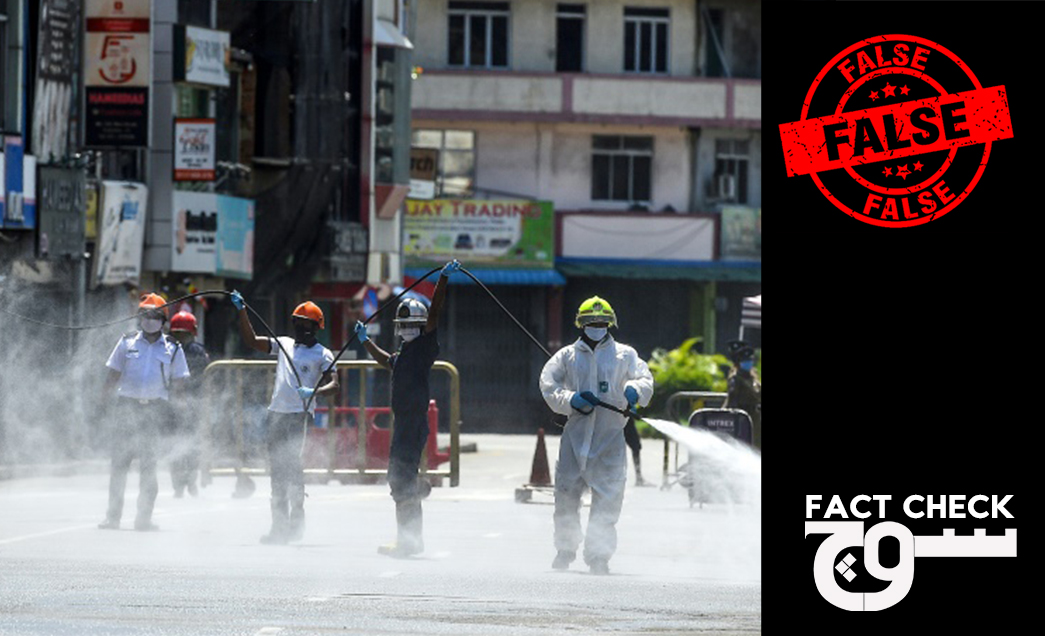
Claim: Fumigation of outdoor spaces with a disinfectant is an effective way to curtail the spread of the Novel Coronavirus (Covid-19).
Fact: Spraying or fumigation of outdoor spaces is not recommended and is ineffective in preventing the spread of Covid-19.
Since the start of the Novel Coronavirus outbreak, we have seen videos and images from around the world of large vehicles driving through crowded streets while spraying disinfectant through an industrial spray hose. Sometimes, individuals in hazmat suits carrying small tanks containing disinfectants are also seen spraying the streets with hoses. This process is known as fumigation— a procedure that results in the release of vapours or mist of an antimicrobial agent in the air in a closed or open space.
In fact, the Sindh High Court even ordered fumigation in all courts and jails. However, according to the World Health Organisation, spraying and fogging outdoor spaces is not recommended to inactivate the Covid-19 virus due to its ineffectiveness.
Wait, doesn’t it make sense to spray disinfectant everywhere to be on the safe side?
Well, not really. To understand why this process is ineffective against the virus, we need to go back to understanding its mode of transmission. Covid-19 primarily spreads through human-to-human contact via airborne droplets and aerosols that originate from infected individuals. The droplets are larger and thus settle on the ground or any other surface more quickly, whereas aerosols are smaller and remain suspended in the air for longer. Although it is important to note that aerosols dry out rapidly, making them less likely to cause an infection even if someone is exposed to them. This is because the longer they are suspended in air, the more their infection load is decreased.
Another way through which the virus is spread is the contamination of objects. As Soch Fact Check has reported earlier, according to a study the COVID-19 virus can survive up to four hours on copper, up to 24 hours on cardboard, and up to two or three days on plastic and stainless steel.
Read more here: Can deliveries, food and banknotes give you coronavirus?
However, it is important to note that these studies are conducted under controlled conditions so it is difficult to accurately estimate how likely it is for you to be infected through this mode of transmission. According to the Centers for Disease Control and Prevention, the transmission of coronavirus occurs much more commonly through respiratory droplets than through objects and surfaces.
Now that we know how the virus spreads, fogging outdoor spaces once in a couple of days, or even once every day makes very little sense. This is because even though spraying disinfectants will reduce the number of aerosols suspended in the air, the environment can be contaminated again as soon as an infected individual enters that particular space.
Moreover, individuals are also less likely to touch their face with their hands if they come into contact with any surface on the street. Therefore it is a lot more effective to consistently recommend stringent personal hygiene.
What do authorities say about this?
In a set of guidelines issued by the Government of Pakistan on “Cleaning & Disinfection of Environmental Surfaces in the wake of COVID-19” dated May 18 says, “spraying or fumigation of outdoor spaces, such as streets or marketplaces has not been proved to kill the COVID-19 virus or other pathogens because disinfectant is inactivated by dirt and debris. Even in the absence of organic matter, chemical spraying is unlikely to adequately cover all surfaces for the duration of the required contact time needed to inactivate pathogens.” Furthermore, “[spraying] could be physically and psychologically harmful and would not reduce an infected person’s ability to spread Covid-19 through droplets or contact. Spraying chlorine or other toxic chemicals on people can cause eye and skin irritation, bronchospasm and gastrointestinal effects.”
Read more about spraying disinfectants here: Walk-through disinfection gates do nothing to prevent Covid-19
In a situation report released on May 14, The World Health Organisation recommends “manual surface cleaning with detergent and water using applied friction (e.g. brushing, scrubbing) [to be applied] first to ensure physical removal of organic materials, followed by the use of a cloth or wipe which is soaked in the disinfectant.” In addition to that, the WHO also says that streets and sidewalks are not considered as routes of infection for Covid-19. “Moreover, disinfectants are inactivated by dirt and debris, and it is not feasible to manually clean and remove all organic matter from such spaces. Even in the absence of organic matter, chemical spraying is unlikely to adequately cover all surfaces for the duration of the required contact time to inactivate pathogens.”
Summary: Street fumigation to prevent the spread of Covid-19 has been taking place in countries around the world, including Pakistan. However, spraying disinfectant in outdoor spaces has not been proved to kill the Covid-19 virus and WHO does not recommend street fumigation.
